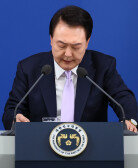U.S. finds it impractical to work on verification for OPCON transfer
U.S. finds it impractical to work on verification for OPCON transfer
Posted October. 23, 2020 07:50,
Updated October. 23, 2020 07:50
The United States stated during last week’s Security Consultative Meeting (SCM) that it is not a feasible idea to execute a verification program of the South Korean military’s combined command capabilities by next year in preparation for a transfer of wartime operational control (OPCON). The South Korean government’s idea was to carry out the second phase verification, which was postponed as this year’s U.S.-R.O.K. joint military drill was scaled back, by the first half of next year and complete the final third phase within the second half. However, Washington said in the SCM that even the second phase verification will not be done within next year. In the event that the verification program is left unfinished until the end of next year, it is almost impossible for the current South Korean administration to get a transfer of OPCON done within its term.
Washington’s position to find it hard to guarantee availability for the verification process within next year is another testament to the two nations’ difference in how they view the OPCON transfer issue. The U.S. government took a clear stance already during the SCM. To the South Korean government, which demanded conditions be preemptively satisfied, U.S. Defense Secretary Mark Esper responded by saying that it takes some time to make it happen. Furthermore, while Seoul wanted to detail a time schedule regarding the OPCON transfer issue, Washington has made it clear that next year will not be available.
On record, the South Korean government aims to realize a transfer of OPCON as soon as possible without any definite deadline, rather than focusing on making it happen during the tenure of the incumbent administration. Nevertheless, the government and the military alike set the goal of completing an OPCON transfer project by early 2022 and accordingly planned on military reform and defense strengthening programs. As of now, their plan is inevitably faced with some disruptions due to delay in the verification process of the South Korean military’s combined command capabilities at a time when the two allies’ joint military exercises were scaled down or canceled amid the prolonged deadlock in denuclearization talks, apart from the ongoing COVID-19 pandemic.
The recent National Assembly inspection discovered that preparations for defense enhancement against North Korean nuclear threats involved a series of loopholes. What’s worse, Pyongyang boasted new strategic and tactic weapon systems in a large-scale military parade. Not any of the three conditions for OPCON transfer has been satisfied yet but rather only stacked the odds against South Korea: the South Korean military’s leadership in combined defense; capabilities to respond to North Korean nuclear and missile programs; and surroundings being set up for security on the Korean Peninsula. Given the status quo, Seoul’s plan may look ridiculous from a viewpoint of Washington.
With just 10 days or so to go for the U.S. presidential election, the result will have significant influence on the security landscape and diplomatic dynamics where Seoul stands. However, the principle of “condition-based OPCON transfer” cannot change no matter who wins the upcoming election. It is not the right way to go to anxiously squeeze an issue that matters to the country’s survival and security into a politically determined time bar and piggyback on what a political shift in Washington may bring about. Unfortunately, the South Korean government’s schedule plan has already turned out to be a faulty and imperfect idea. It is time to rearrange the schedule while coming up with ways to plug the existing loopholes.







